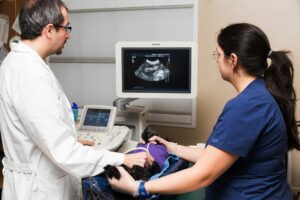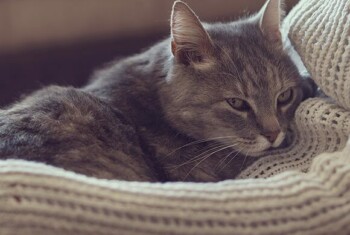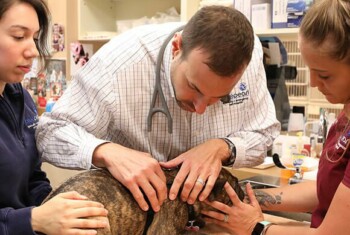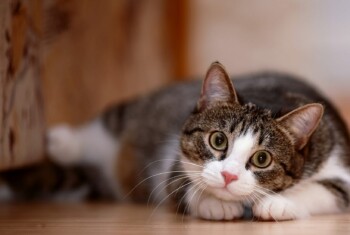Heart Disease in Cats: Diagnosis, Treatment and Prognosis
There are several types of heart muscle diseases (cardiomyopathies) in cats.
Hypertrophic cardiomyopathy (HCM) is an inherited disorder that manifests as thickening of the left ventricle (one of the lower chambers of the heart), such that the heart muscle has a decreased ability to relax and fill normally with blood.
Breeds such as the Maine coon and ragdoll have been found to be predisposed. Restrictive cardiomyopathy (RCM) is characterized by stiffening of the ventricles, with a decreased ability to relax, and often to contract.
Dilated cardiomyopathy (DCM) is characterized by dilation and weakening of one or both ventricles such that the heart has a decreased ability to contract and pump blood forward to the body. This historically has been associated with taurine-deficient diets and is now rare in cats.
Unclassified cardiomyopathy (UCM) is the term used for cats with cardiac abnormalities that do not necessarily fit into one of the above categories.
Diagnosis
Cats with heart disease may be identified based on physical exam findings, such as heart murmur, arrhythmia (abnormal heart rhythm) or gallop rhythm. However, in some cases there are no abnormalities on physical exam.
The best way to diagnose heart disease is by referral to a cardiologist for an echocardiogram (ultrasound of the heart), which can evaluate heart function, the presence of specific heart chamber enlargement, and other existing complications of heart disease. Thoracic radiographs are often used to evaluate for congestive heart failure (fluid around the lungs). Other diagnostics, such as blood pressure or blood work, may be recommended to further evaluate for abnormalities that may complicate management of heart disease.
of the heart), which can evaluate heart function, the presence of specific heart chamber enlargement, and other existing complications of heart disease. Thoracic radiographs are often used to evaluate for congestive heart failure (fluid around the lungs). Other diagnostics, such as blood pressure or blood work, may be recommended to further evaluate for abnormalities that may complicate management of heart disease.
Complications
The progression of feline heart disease is variable and should be monitored on a regular basis. Over time, signs of heart failure may develop, which include an increased respiratory rate and effort, loss of appetite, lethargy, weakness, exercise intolerance and collapse.
In addition, cats with heart disease and severe enlargement of the atria (top chambers of the heart) may be more prone to paralysis or lameness of the hind limbs or right front limb, acute kidney failure, sudden difficulty breathing or sudden death. Arrhythmias (abnormal heart rhythms) may also be present and increase the risk for sudden death.
Systolic anterior motion of the mitral valve (SAM) is an abnormal movement of the mitral valve, which separates the left atrium from the left ventricle. Normally when the heart contracts, this valve is closed, preventing backflow of blood from the left ventricle to the left atrium. With SAM, one of the mitral valve leaflets actually swings in the opposite direction and obstructs the outflow of blood from the left

ventricle out of the aorta to the body.
Diseases that cause high blood pressure, such as hyperthyroidism and kidney disease, can be complicating factors in the management of heart disease and should be monitored and treated as needed.
Treatment
In the asymptomatic stages of feline heart disease, treatment may or may not be indicated, depending on the echocardiographic findings. Medications, such as diltiazem, may be used to help improve relaxation of the heart muscle, or atenolol, a beta blocker, may be used to slow the heart rate in an attempt to
reduce SAM. In addition, if significant enlargement of one or both atria is present, medications such as angiotensin-converting enzyme (ACE) inhibitors and anti-platelet medications are recommended to reduce the risk of blood clot formation.
Diet changes are usually not indicated; however, avoiding high sodium diets and treats is always a good practice.
Once heart failure develops, diuretics such as furosemide are used. In addition, although not currently labeled for use in cats, pimobendan may be used at the discretion of your cardiologist, following a diagnosis made by echocardiogram. If your pet has advanced heart disease, it is recommended that he or she remain indoors or go outdoors only with supervision.
Prognosis
Feline heart disease is often a progressive disease. With careful monitoring, appropriate medical therapy can be implemented earlier in hopes of preventing rapid decline into severe heart failure and limiting visits to the hospital or emergency room. Our goal is to keep your pet feeling as good as possible for as long as possible.
If your pet begins to show any signs of breathing difficulty, loss of appetite, sudden lameness or
paralysis, exercise intolerance or collapse, he or she should be evaluated sooner. Please call us if any of the above clinical signs become apparent.
For more information on this disease, speak to the veterinarian who is treating your pet.


